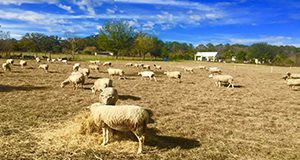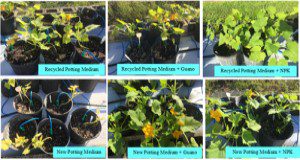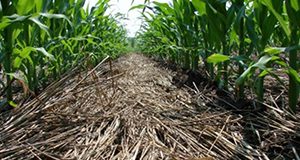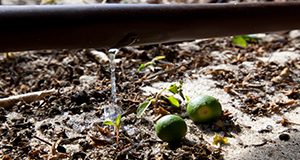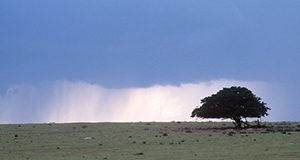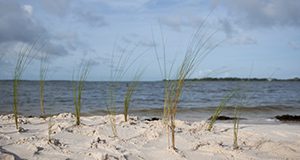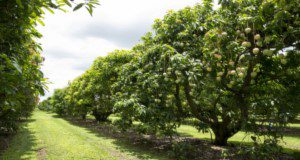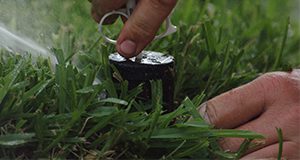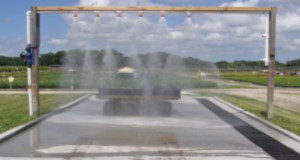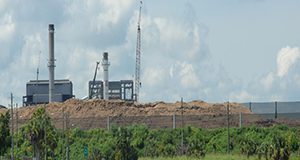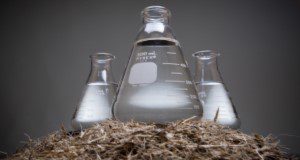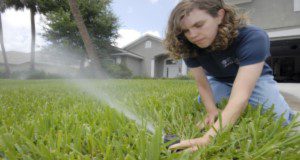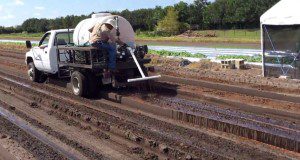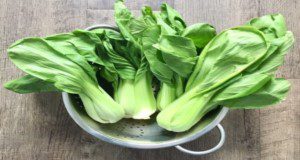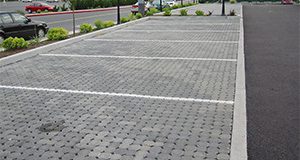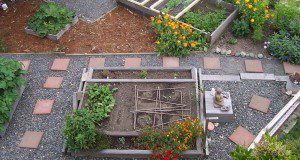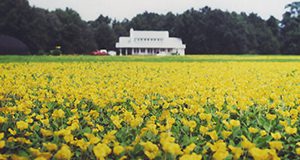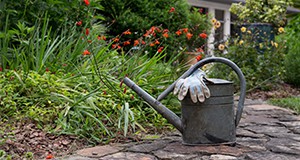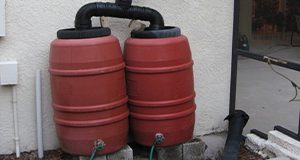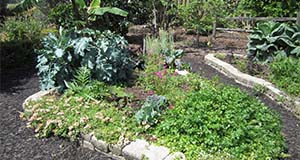This 3-page publication provides a brief overview of resistance to gastrointestinal nematode infections in Florida Native sheep. Written by Zaira M. Estrada Reyes, Owen Rae, Carol Postley, and Raluca G. Mateescu, and published by the UF/IFAS Department of Animal Sciences, August 2020.
https://edis.ifas.ufl.edu/an361
Category: Sustainable Living
Use of Recycled Potting Medium for Containerized Production of Squash
Vegetable growers are keen on cost-cutting measures to increase profitability. Containerized vegetable production can be done in a shade-house or garden, and it often requires commercial potting media. Although expensive, potting media are lightweight and provide high water- and nutrient-holding capacities, and thus they are widely used by growers. Growers often discard or compost the potting media after a single season due to issues such as diseases, pests, and weeds. However, old potting media could be reused for containerized production if appropriately sterilized and amended with fertilizer salts. The current study was conducted to determine the feasibility of using sterilized recycled potting medium amended with fertilizer salts for containerized production of squash. This new 4-page publication of the UF/IFAS Horticultural Sciences Department was written by Marie Dorval, Riphine Mainviel, Vincent Michael, Yuqing Fu, Bala Rathinasabapathi, and Geoffrey Meru.
https://edis.ifas.ufl.edu/hs1404
Transitioning from Conventional to Organic Farming Using Conservation Tillage
Organic farming is one of the fastest-growing segments of the agricultural industry in the United States and in Florida. Conservation tillage is often employed to reduce soil erosion, improve physical and biological properties of soil, and increase water use efficiency. This 5-page article aims to provide recommendations to row crop farmers who wish to implement conservation tillage practices during their transition to a certified organic system. Written by D. L. Wright, J. Moyer, D. Treadwell, I. M. Small, and S. George, and published by the UF/IFAS Agronomy Department, revised November 2020.
https://edis.ifas.ufl.edu/ag246
Consejos Basicos para Disenar Sistemas Eficientes de Riego
Este documento provee un panorama básico de los factores más importantes al diseñar. Written by Haimanote K. Bayabil, Kati W. Migliaccio, Michael Dukes, Laura Vasquez, and Carlos Balerdi, and published by the UF/IFAS Department of Agricultural and Biological Engineering, December 2020.
https://edis.ifas.ufl.edu/ae549
How Are Our Future Agriculture and Natural Resources Projected under Varying Climate?
This 8-page article explains how agriculture and natural resources may respond to projected future climate and how climate projections can be useful in developing management plans for the improved sustainability of Florida's agriculture and natural resources. It also aims to help increase the public awareness of climate change impacts on Florida and improve understanding of the connections among climate, agriculture, and natural resources. Written by Young Gu Her, Ashley Smyth, Zachary Brym, and Elias Bassil, and published by the UF/IFAS Department of Agricultural and Biological Engineering, September 2020.
https://edis.ifas.ufl.edu/ae545
Online Sources for Sea Level Rise Education and Extension
The impacts of sea level rise on ecosystems and natural resources are a major concern in Florida, especially in low-lying coastal areas such as south Florida. Sea level rise can impact many aspects of Florida's economy, including urban development, agriculture, infrastructure, and natural areas. This 16-page document introduces, evaluates, and summarizes selected available online sources and tools to educate diverse stakeholders and concerned local residents on important aspects of sea level rise. Written by Young Gu Her, Ashley Smyth, Jiangxiao Qiu, Elias Bassil, Ulrich Stingl, and Laura Reynolds, and published by the UF/IFAS Department of Agricultural and Biological Engineering, June 2020.
https://edis.ifas.ufl.edu/ae543
Planning for a Successful Commercial Subtropical/Tropical Fruit Grove
Planning is the key to successful grove establishment, maintenance, and production. Developing a detailed infrastructure description and plan, cultural program, and financial and marketing plan for a new or existing grove with a new fruit crop will save you time and money and help minimize mistakes. Prospective growers should compile and analyze information needed to select a grove site, establish the needed infrastructure, and develop maintenance plans for the plants and how the production will be marketed. This new 15-page publication of the UF/IFAS Horticultural Sciences Department presents an outline of the type of information growers need when establishing a tropical fruit grove or contemplating management or modification of an existing grove. Written by Jonathan Crane, Yuncong Li, Edward Evans, Fredy Ballen, and Jeff Wasielewski.
https://edis.ifas.ufl.edu/hs1387
Florida H2OSAV Insights: Home Water Use in the Gainesville Regional Utilities (GRU) Service Territory
This 6-page fact sheet discusses basics about water consumption for single-family, detached homes served by Gainesville Regional Utilities, information about the highest water users, and impacts of irrigation on water consumption. Written by Nick Taylor, Kaitlin Olander Robb Price, Bradley Spatz, Tricia Kyzar, and Pierce Jones, and published by the UF/IFAS Department of Agricultural and Biological Engineering, September 2020.
https://edis.ifas.ufl.edu/ae544
Watering Station Best Management Practices for Container Nurseries
Watering stations are specialized irrigation structures where plants are watered immediately after transplanting. Water not retained by the container substrate as well as water falling between containers becomes runoff. This runoff can contain sediment and nutrients, such as nitrogen and phosphorus, that can impact natural waters if not managed according to Best Management Practices (BMPs). The purpose of this new 3-page fact sheet is to provide examples of how runoff from watering stations at two nurseries was managed after implementation of the BMP. Written by Tom Yeager and published by the UF/IFAS Environmental Horticulture Department.
https://edis.ifas.ufl.edu/ep590
Bagasse: A Potential Organic Soil Amendment Used in Sugarcane Production
Bagasse is an agricultural by-product derived from the sugarcane milling process. It is a dry and fibrous residue left after the extraction of sugar juice from sugarcane. This 5-page document is a preliminary investigation into the possible effects of using bagasse as a soil amendment. Written by Jehangir H. Bhadha, Nan Xu, Raju Khatiwada, Stewart Swanson, and Chris LaBorde, and published by the UF/IFAS Department of Soil and Water Sciences, August 2020.
https://edis.ifas.ufl.edu/ss690
Biofuel: Concepts and Considerations
Biofuels are combustible fuels derived from recently produced biomass, as opposed to ancient biomass, which is the source of petroleum products. The term biofuel usually refers to liquid fuels used as replacements for or additives to petroleum-based liquid fuel. This new 6-page publication of the UF/IFAS Department of Soil and Water Sciences serves as an introduction to biofuels for Extension educators and anyone interested in learning basic terminology, concepts, and impacts of biofuels as a replacement for fossil fuels. Written by Tanumoy Bera, Kanika S. Inglett, and Ann C. Wilkie.
https://edis.ifas.ufl.edu/ss688
Best Practices for Communicating about Outdoor Residential Water Conservation
Extension communication efforts can be made more effective when following a strategic communication plan. To guide a strategic communication effort, it is imperative to have purposeful messaging along with an understanding of your target audience and communication channel. This new 3-page document, published by the UF/IFAS Department of Agricultural Education and Communication, presents a synthesis of literature highlighting best communication practices in regard to water conservation efforts. Written by Jacqueline Aenlle and Laura A. Sanagorski Warner.
https://edis.ifas.ufl.edu/wc366
Implementation of Anaerobic Soil Disinfestation in Florida Tomato Production
Anaerobic soil disinfestation (ASD) is a relatively new technique that appears to be a promising tool for soilborne pest management and crop production improvement. This new 5-page publication of the UF/IFAS Horticultural Sciences Department is intended to introduce ASD for Florida vegetable growers. Written by Bodh R. Paudel, Francesco Di Gioia, Qiang Zhu, Xin Zhao, Monica Ozores-Hampton, Marilyn E. Swisher, Kaylene Sattanno, Jason C. Hong, and Erin N. Rosskopf.
http://edis.ifas.ufl.edu/hs1345
Bok Choy, an Asian Leafy Green Vegetable Emerging in Florida
Asian vegetable crops are rapidly expanding in Florida in the last decade due to their health benefits combined with their high profitability. These crops can help increase vegetable growers’ income and diversify Florida’s crop production, and they are new to most Floridians. This new 5-page article provides a general overview of bok choy for vegetable growers, crop consultants, certified crop advisors, Extension agents, and graduate students. Written by Hai Liu and Guodong Liu and published by the UF/IFAS Horticultural Sciences Department.
https://edis.ifas.ufl.edu/hs1337
Permeable Pavement Systems: Technical Considerations
Permeable pavement systems are Green Stormwater Infrastructure practices that can reduce runoff while supporting vehicle and pedestrian traffic. This new 8-page document provides technical details of permeable pavement systems, such as application, system elements, design, installation, operation, maintenance, crediting, and costs, in order to inform planners, engineers, landscape architects, local government officials, and other professionals in the built environment about the considerations for implementing and maintaining permeable pavements. Written by E. Bean, M. Clark, and B. Larson, and published by the UF/IFAS Department of Agricultural and Biological Engineering, April 2019.
http://edis.ifas.ufl.edu/ae530
How to Establish an Urban Agriculture Ordinance
While the desire to implement urban agriculture projects is growing in popularity, there is little information available to help Extension agents and interested citizens fully understand how to implement urban agriculture in their community. This new 11-page document provides an overview of key information required to establish an urban agriculture ordinance. Case studies from urban agriculture initiatives in Florida provide real-world examples of the required activities, potential challenges, and beneficial partners for implementing these initiatives. Resources related to the case studies and additional urban agriculture resources can be found at the end of the document, so that readers can find further information specific to their interests and needs. Written by Candace A. Spencer, Catherine G. Campbell, Anna Prizzia, and Liz Felter, and published by the UF/IFAS Horticultural Sciences Department.
http://edis.ifas.ufl.edu/hs1327
Ecosystem Services Provided by Grass-Legume Pastures
Grasslands produce far more than beef and milk. They provide ecosystem services that benefit people and the environment. This new 3-page document discusses how integrating forage legumes into grasslands enhances their capacity to provide ecosystem services, such as C sequestration, habitat for wildlife and pollinators, water catchment and purification, and nutrient cycling. Written by Jose Dubeux, Jr., Lynn Sollenberger, Mark Mauldin, and Liza Garcia, and published by the UF/IFAS Agronomy Department, October 2018.
http://edis.ifas.ufl.edu/ag423
Using Perceived Landscape Benefits to Subgroup Extension Clients to Promote Urban Landscape Water Conservation
Because a large percentage of water used in urban areas can be applied through irrigation, home landscape management practices are an important factor of water conservation. The information in this 5-page document is the result of a cluster analysis used to identify meaningful subgroups among home irrigation users to encourage water conservation behaviors. Written by Amanda D. Ali, Laura A. Sanagorski Warner, and Anil Kumar Chaudhary and published by the UF/IFAS Department of Agricultural Education and Communication, May 2018.
http://edis.ifas.ufl.edu/wc291
Rain Barrel Owners: Meeting the Programming Needs of This Unique Extension Audience
Rain barrels make it easy for households to practice water conservation. Extension programs for rain barrel construction, decoration, and giveaways can raise awareness for (and encourage use of) this technology. This 9-page document will provide insight into the behavior and attitudes of rain barrel owners so that Extension professionals may gain a better understanding of this unique audience. Written by Emily Ott, Paul Monaghan, Wendy Wilber, Lynn Barber, and Karissa Raymond and published by the UF/IFAS Department of Agricultural Education and Communication, March 2018.
http://edis.ifas.ufl.edu/wc297
Stakeholder-Identified Community Garden Program Outcomes
Extension clientele often contact agents for expertise on starting or maintaining a community garden; however, agents’ ability to collect meaningful data from these activities can be a challenge. This 3-page publication discusses a statewide study that was conducted by the author to identify community garden outcomes. Written by Susan Webb and John Diaz and published by the UF/IFAS Department of Agricultural Education and Communication, January 2018.
http://edis.ifas.ufl.edu/wc295
